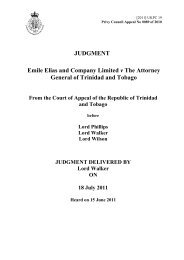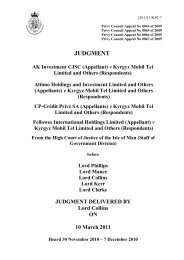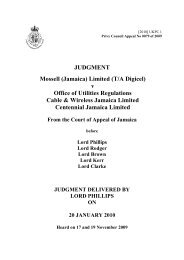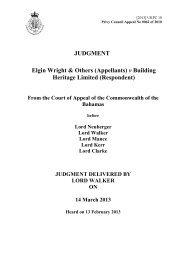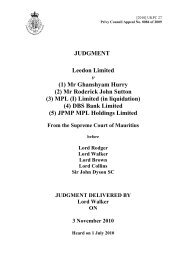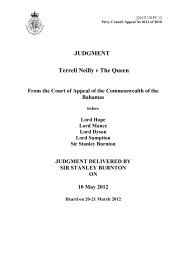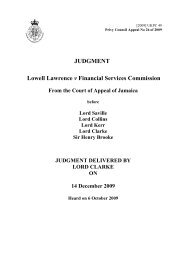Nadine Rodriguez v (1) Minister of Housing of the Government (2 ...
Nadine Rodriguez v (1) Minister of Housing of the Government (2 ...
Nadine Rodriguez v (1) Minister of Housing of the Government (2 ...
Create successful ePaper yourself
Turn your PDF publications into a flip-book with our unique Google optimized e-Paper software.
“The distinction between heterosexual and homosexual couples might be aimed<br />
at discouraging homosexual relationships generally. But that cannot now be<br />
regarded as a legitimate aim. It is inconsistent with <strong>the</strong> right to respect for<br />
private life accorded to ‘everyone’, including homosexuals, by article 8 since<br />
Dudgeon v United Kingdom (1981) 4 EHRR 149. If it is not legitimate to<br />
discourage homosexual relationships, it cannot be legitimate to discourage<br />
stable, committed, marriage-like homosexual relationships . . . Society wants<br />
its intimate relationships, particularly but not only if <strong>the</strong>re are children<br />
involved, to be stable, responsible and secure. It is <strong>the</strong> transient, irresponsible<br />
and insecure relationships which cause us so much concern.”<br />
The aim <strong>of</strong> discouraging homosexual relationships is equally impermissible under<br />
sections 7(1) and 14 <strong>of</strong> <strong>the</strong> Constitution <strong>of</strong> Gibraltar.<br />
27. Of course, <strong>the</strong> policy does not privilege married couples above everyone else. It<br />
also privileges unmarried opposite sex couples who have a child in common. The aim<br />
is said to be to protect <strong>the</strong> children but, if so, it is difficult to understand why it is<br />
limited to couples with a child in common, and does not extend to o<strong>the</strong>r couples who<br />
have undertaken parental responsibility for minor children. The policy also extends to<br />
parents and adult children living with <strong>the</strong> tenant. The aim here must be to protect <strong>the</strong><br />
family home. But if so, it is difficult to understand why it does not extend to<br />
protecting <strong>the</strong> homes <strong>of</strong> people whom we now recognise as being members <strong>of</strong> <strong>the</strong><br />
same family: see Fitzpatrick v Sterling <strong>Housing</strong> Association Ltd [2001] 1 AC 27. In<br />
short, <strong>the</strong> suggested aims are incoherent and <strong>the</strong> means employed are not rationally<br />
connected to those aims.<br />
28. In <strong>the</strong> Board’s view, <strong>the</strong>refore, <strong>the</strong> discriminatory effect <strong>of</strong> <strong>the</strong> policy cannot be<br />
justified because it is not rationally related to a legitimate aim. But <strong>the</strong>re is ano<strong>the</strong>r<br />
reason why it cannot be justified.<br />
In accordance with <strong>the</strong> law<br />
29. Dudley J, having held that <strong>the</strong>re was no discrimination because <strong>the</strong> appellant<br />
and her partner were being treated in <strong>the</strong> same way as o<strong>the</strong>r unmarried couples with<br />
no children, went on to observe that once <strong>the</strong> rights and freedoms protected by <strong>the</strong><br />
Constitution were engaged, any interference had to be in accordance with <strong>the</strong> law, and<br />
to satisfy a legitimate aim and <strong>the</strong> principle <strong>of</strong> proportionality. These concepts are<br />
taken from article 8(2) <strong>of</strong> <strong>the</strong> ECHR. They do not emerge with <strong>the</strong> same clarity from<br />
sections 7 and 14 <strong>of</strong> <strong>the</strong> Constitution. However, <strong>the</strong> exceptions contained in section<br />
7(3) apply only to things done “under <strong>the</strong> authority <strong>of</strong> any law”. Similarly <strong>the</strong><br />
exceptions in section 14(7) apply only to things done “under <strong>the</strong> authority <strong>of</strong> any law”,<br />
-12-



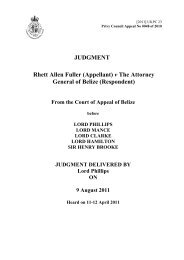
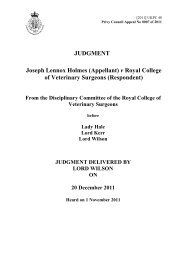
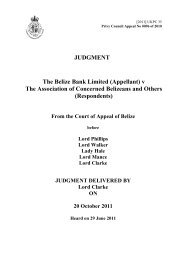
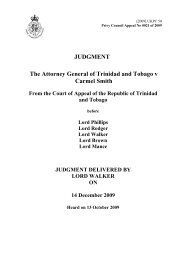
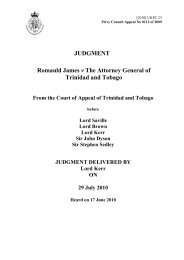
![[2011] UKPC 10 - Judicial Committee of the Privy Council](https://img.yumpu.com/23644185/1/184x260/2011-ukpc-10-judicial-committee-of-the-privy-council.jpg?quality=85)
